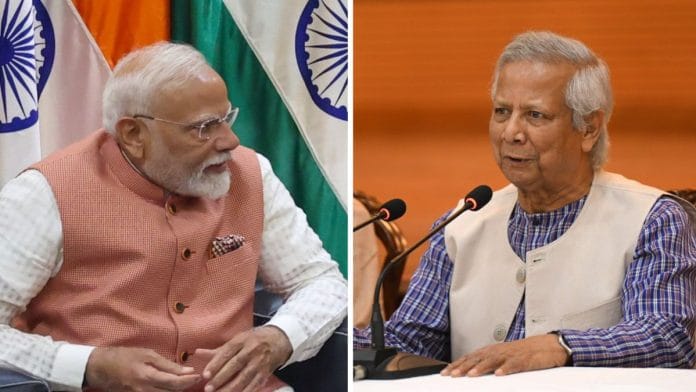Bangkok: A maritime transport cooperation pact that Prime Minister Narendra Modi is expected to sign at the upcoming BIMSTEC summit in Bangkok has gained renewed importance after Bangladesh Chief Adviser Muhammad Yunus’s claim that his country was the “only” guardian of the ocean in the region.
During his first foreign visit to China last week, Yunus claimed that India’s northeast, on the border with China, was “landlocked”, urging Beijing to make Bangladesh an “extension of the Chinese economy—building, producing, and marketing goods for China and the world”.
Ties between India and Bangladesh have remained tense since the ouster of the Sheikh Hasina government last year, with Dhaka increasingly reaching out to both China and Pakistan. Pakistan’s Foreign Minister Ishaq Dar is expected to visit Bangladesh on 22 April.
Yunus’s comments were significant as Bangladesh is set to take over the chair of the Bay of Bengal Initiative for Multi-Sectoral Technical and Economic Cooperation, or BIMSTEC, in the summit on 3 and 4 April.
In the last decade, BIMSTEC, which also includes Sri Lanka, Thailand, Myanmar, Nepal and Bhutan, has become increasingly important for New Delhi as a mechanism for regional cooperation. This is particularly as the other regional grouping, the South Asia Association for Regional Cooperation (SAARC), which has Pakistan as a member, remains moribund.
When asked about Bangladesh’s future role as chair of the organisation at a press briefing Friday, Jaideep Mazumdar, the former Secretary (East) at the Ministry of External Affairs (MEA), said, “As far as Chairmanship of BIMSTEC is concerned, I think all the seven countries of BIMSTEC are equally committed to integration and regional cooperation.”
The same day, at an online conference, BIMSTEC Secretary General Indra Mani Pandey said the leaders of the regional grouping would adopt its first vision document—Bangkok Vision 2030, a key agreement on maritime cooperation — and several Memorandums of Understanding (MoUs) at the summit in the Thai capital.
While the vision document will lay out the plan for regional development, the Agreement on Maritime Transport Cooperation is aimed at improving cargo and passenger transport across the Bay of Bengal.
India’s ties in the adjoining region are significant for the northeast states that are strategically important for India’s security. In recent years, India has worked on improving the strategic security in the region while investing in key transportation projects, such as the India-Myanmar-Thailand Trilateral Highway, which would see Manipur’s Moreh connected to Thailand’s Mae Sot.
India has also built port facilities at Sittwe in Myanmar to create an alternative and shorter sea access for the northeast, which goes on to Kolkata. Both projects, however, have faced a number of challenges, mostly due to the ongoing civil war in Myanmar.
Currently, the only land route connecting India’s northeast with the rest of the country is the narrow Siliguri corridor.
Also Read: India’s Northeast ‘landlocked’, Bangladesh the ‘only guardian’ of ocean in region—Yunus in China
A political churn among members
The summit also comes at a time when Nepal, Sri Lanka, Myanmar, and Thailand are also experiencing political instability at home.
In Nepal, pro-monarchy protests last week turned deadly, with at least two people killed in clashes with police. The monarchy in Nepal was dissolved in 2008 after a deal with former Maoist rebels to end a decade-long insurgency.
Political instability, with over 13 leaders in the last 17 years, and the lack of economic growth have raised public anger.
Myanmar, where the military coup entered its fourth year, and Thailand, where the prime minister was dismissed by a court last year, are reeling with the aftereffects of a deadly earthquake last week. The 7.7-magnitude earthquake has killed at least 2,000 people so far.
India has deployed a field hospital in Mandalay, 80 search and rescue personnel from the National Disaster Response Force (NDRF), and humanitarian assistance by both air and sea.
The military junta is expected to be present at a senior level, however, it remains to be seen whether Senior General Min Aung Hlaing will attend the summit.
In Thailand, Paetongtarn Shinawatra assumed the role of prime minister in August last year after Srettha Thavisin became the fourth PM in 16 years to be dismissed by the constitutional court of the country.
In Sri Lanka, Anura Kumara Dissanayake stormed to power during the presidential elections last September, while his political alliance– the National People’s Power–won 159 out of 225 seats in the subsequent parliamentary elections. Dissanayake is not expected to attend the Bangkok Summit. Instead, Prime Minister Harini Amarasuriya is expected to lead the Sri Lankan delegation.
The last BIMSTEC summit was held virtually in 2022 by Sri Lanka and this is the first in-person summit since the 2018 summit in Kathmandu, Nepal.
Last year, a charter for the organisation finally came into effect, giving the grouping an “international personality”, according to Mazumdar. The charter “lays down its principles and purposes and also the basic institutional architecture of the grouping”, he said.
The organisation is currently focusing on building institutions to cooperate in areas such as security—including maritime and cyber security—food and human security, humanitarian assistance and disaster relief, as well as increased connectivity and energy cooperation.
PM Modi is set to travel to Sri Lanka, visiting Colombo and Anuradhapura from 4 April to 6 April, following the BIMSTEC summit.
(Edited by Sanya Mathur)
Also Read: PM Modi to visit Sri Lanka after attending BIMSTEC Summit in Bangkok







Bangladesh is deviding india by calling north east as ‘land locked’ . This is an attack on india’s sovereignty. Yet the author is gossiping.
In the list of countries facing political instability, the author has forgotten to include Bangladesh.